
Judge temporarily blocks Trump admin from revoking Harvard enrollment of foreign students
BOSTON -- A U.S. judge on Friday temporarily blocked the Trump administration from revoking Harvard University's ability to enroll foreign students, a policy the Ivy League school called part of President Donald Trump's broader effort to retaliate against it for refusing to "surrender its academic independence."
The order provides temporary relief to thousands of international students who were faced with being forced to transfer under a policy that the Cambridge, Massachusetts-based university called a "blatant violation" of the U.S. Constitution and other federal laws, and said would have an "immediate and devastating effect" on the university and more than 7,000 visa holders.
"Without its international students, Harvard is not Harvard," the 389-year-old school said in its lawsuit filed earlier on Friday in Boston federal court. Harvard enrolled nearly 6,800 international students in its current school year, equal to 27% of total enrollment.
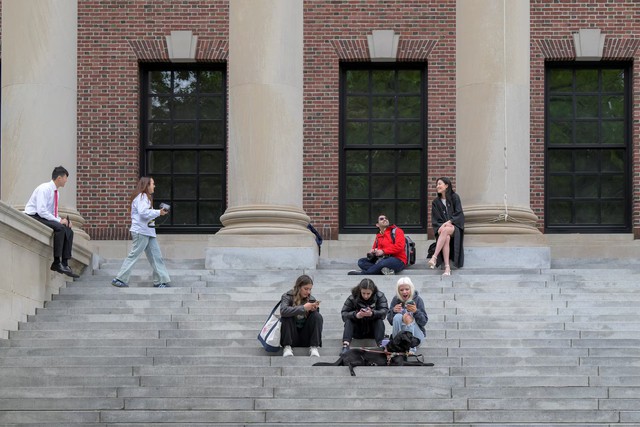
Students gather on the campus of Harvard University in Cambridge, Massachusetts, U.S., May 23, 2025. Photo: Reuters
The move was the latest escalation in a broader battle between Harvard and the White House, as Trump seeks to compel universities, law firms, news media, courts and other institutions that value independence from partisan politics to align with his agenda. Trump and fellow Republicans have long accused elite universities of left-wing bias.
Harvard has pushed back hard against Trump, having previously sued to restore nearly $3 billion in federal grants that had been frozen or canceled. In recent weeks, the administration has proposed ending Harvard's tax-exempt status and hiking taxes on its endowment, and opened an investigation into whether it violated civil rights laws.
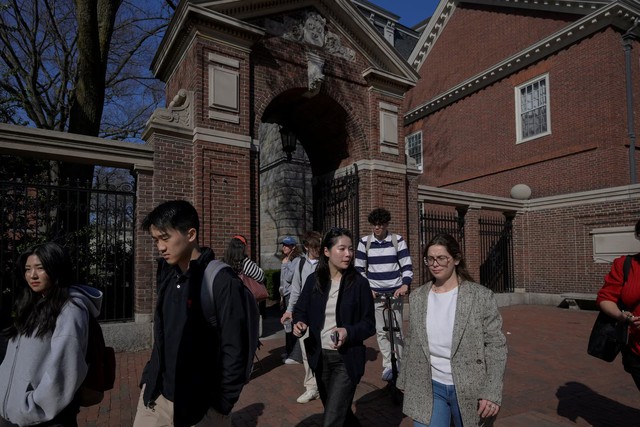
Students walk on the campus of Harvard University in Cambridge, Massachusetts, U.S., April 15, 2025. Photo: Reuters
Leo Gerden, a Swedish student set to graduate Harvard with an undergraduate degree in economics and government this month, called the judge's ruling a "great first step" but said international students were bracing for a long legal fight that would keep them in limbo.
"There is no single decision by Trump or by Harvard or by a judge that is going to put an end to this tyranny of what Trump is doing," Gerden said.
In its complaint, Harvard said the revocation would force it to retract admissions for thousands of people, and has thrown "countless" academic programs, clinics, courses and research laboratories into disarray, just a few days before graduation. It said the revocation was a punishment for Harvard's "perceived viewpoint," which it called a violation of the right to free speech as guaranteed by the U.S. Constitution's First Amendment.
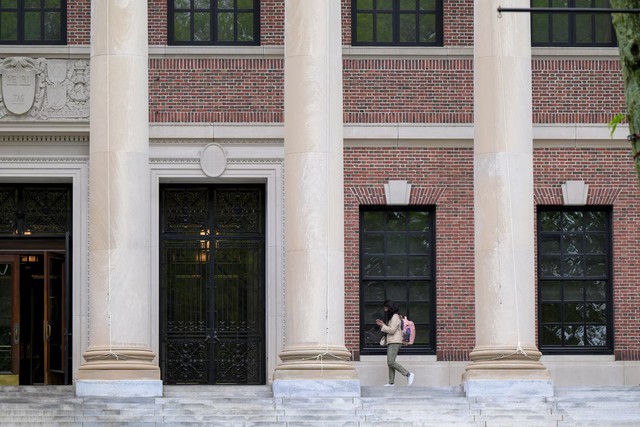
A student walks on the campus of Harvard University in Cambridge, Massachusetts, U.S., May 23, 2025. Photo: Reuters
The Trump administration may appeal U.S. District Judge Allison Burroughs' ruling. In a statement, White House spokeswoman Abigail Jackson said, "unelected judges have no right to stop the Trump Administration from exercising their rightful control over immigration policy and national security policy."
Since Trump's inauguration on January 20, his administration has accused several universities of indifference toward the welfare of Jewish students during widespread campus protests against Israel's military campaign in Gaza.
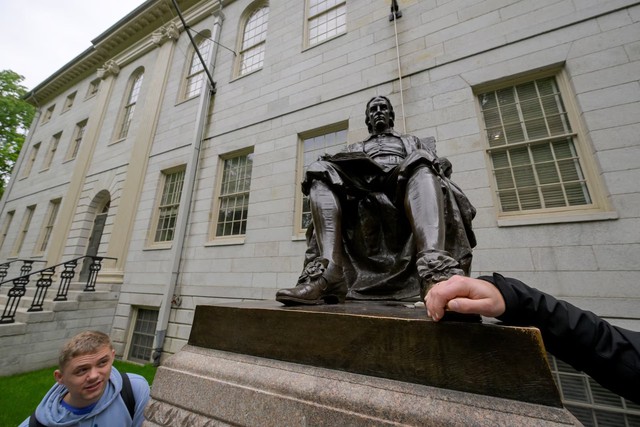
A tourist touches the foot of the John Harvard Statue on the campus of Harvard University in Cambridge, Massachusetts, U.S., May 23, 2025. Photo: Reuters
Harvard's court challenges over the administration's policies stand in contrast to its New York-based peer Columbia University's concessions to similar pressure. Columbia agreed to reform disciplinary processes and review curricula for courses on the Middle East, after Trump pulled $400 million in funding over allegations the Ivy League school had not done enough to combat antisemitism.
Harvard says it is committed to combating antisemitism and investigating credible allegations of civil rights violations.
Havard defends 'refusal to surrender'
In her brief order blocking the policy for two weeks, Burroughs said Harvard had shown it could be harmed before there was an opportunity to hear the case in full. The judge, an appointee of Democratic President Barack Obama, scheduled hearings for May 27 and May 29 to consider next steps in the case. Burroughs is also overseeing Harvard's lawsuit over the grant funds.
Harvard University President Alan Garber said the administration was illegally seeking to assert control over the private university's curriculum, faculty and student body.
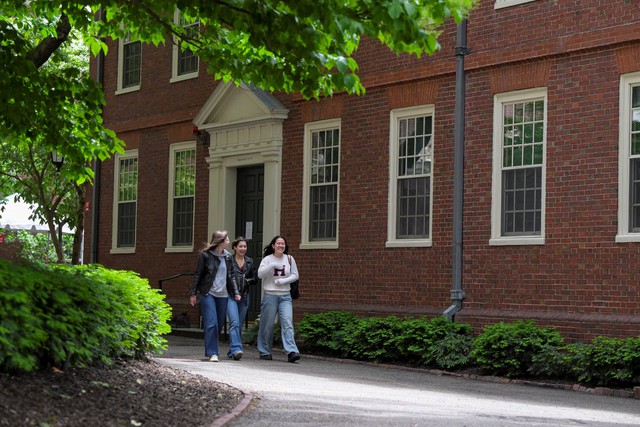
Students walk on the campus of Harvard University in Cambridge, Massachusetts, U.S., May 23, 2025. Photo: Reuters
"The revocation continues a series of government actions to retaliate against Harvard for our refusal to surrender our academic independence," Garber wrote in a letter on Friday to the Harvard community.
The revocation could also weigh on Harvard's finances. At many U.S. universities, international students are more likely to pay full tuition, essentially subsidizing aid for other students.
"It is a privilege, not a right, for universities to enroll foreign students and benefit from their higher tuition payments," DHS spokesperson Tricia McLaughlin said in a statement.
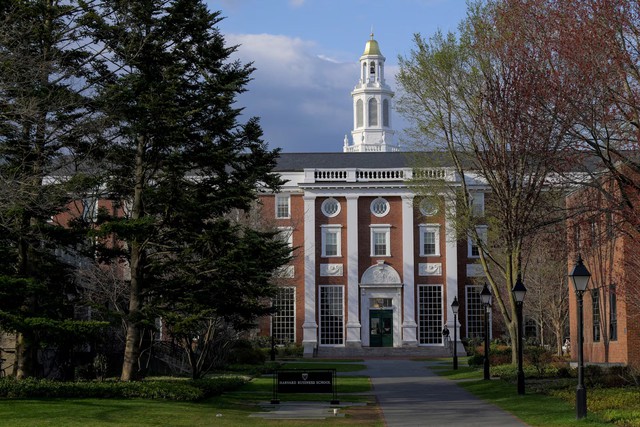
The campus of Harvard University in Cambridge, Massachusetts, U.S., May 23, 2025. Photo: Reuters
Harvard's bonds, part of its $8.2 billion debt pile, have been falling since Trump first warned U.S. universities in March of cuts to federal funding.
International students enrolled at Harvard include Cleo Carney, daughter of Canadian Prime Minister Mark Carney, and Princess Elisabeth, first in line to the Belgian throne.
Reuters